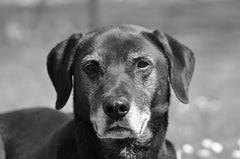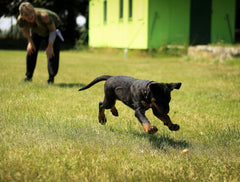
I was walking down the street with my girlfriend yesterday, and while crossing, we passed a lady walking her Boston Terrier. She was walking toward us, and her dog started barking at us and pulling on her leash.
Do you know how some dogs bark, but others take it to the next level by pulling on the leash and almost jumping?
I had seen this happen many times, usually when another dog is present, but not necessarily. So I looked at my girlfriend, smiling, and then at the lady's dog and said, "yes, I know, you're so tough!".
I was curious to know what caused this. I thought: "this dog must be shy, and he is overcompensating." However, I also thought that maybe there is more to it.
Leash reactivity
This phenomenon is called "leash reactivity," and for a reason: it tends to happen more when your dog is on a leash. The leash sometimes creates extra tension and anxiety, and taking your dog off the leash may help relax them.
Nevertheless, this short-term fix may or may not work, and it doesn't solve the root cause. The good news is that this is still a minor issue that you can resolve. We will see how below.
What causes leash reactivity?
Dog owners know their dogs best, and if you identify with one of the situations below, it is likely the cause of your dog's anxiety when seeing another dog in the street.
I would also recommend considering the context when that happens: is it exclusively towards other people or dogs? Is it towards bigger dogs or not necessarily? Is it when your dog is on or off the leash?
Understanding the pattern will help you find the cause.
Here are the main reasons for leash reactivity based on my research:
- Parents. Not you, but your dog's parents. If they were insecure, they likely passed that onto them.
- Lack of socialization. Dogs need to understand how to interact with other dogs; otherwise, they might lack the skills to do so, leading to leash reactivity.
- Lack of leadership. Dogs feel most secure with structure in their lives, and if they don't receive this from you, they might become insecure and overcompensate.
- Negative experience. If your dog was ever bitten or bullied by another dog, it is a likely cause of leash reactivity.
- Learned behavior from another dog. Do you own several dogs? One dog's behavior may have impacted your other dog.
- Leash frustration. If your dog is used to playing off-leash, they might be frustrated when seeing other dogs while on the leash.
Here is what you can do to help
The first thing you should consider is the leash. If you are currently using a regular collar, switch to a harness. Traditional collars may restrict your dog's airway and make them more anxious.
In most cases, you can fix leash reactivity by socializing your dog more with new people, other animals, and new environments.
Socializing your dog with new people
Let your dog approach new people at his own pace at home or outside without forcing him. However, do make sure to associate this encounter with something positive. For example, you may want to carry some treats your dog likes and give him one during the meeting.
If you have puppies, it would be good to get them used to meeting new people: friends, family members, kids, etc.
Socializing your dog with other animals
Use your best judgment, or ask the other pet owner if the other pet is friendly.
If your dog is being pushy or overly excited, redirect him. However, if he is acting the right way, reward him verbally. You can also carry treats with you: this will create a positive association between meeting other animals and him getting rewarded.
Remember that as a rule of thumb, rewarding works better than punishment.
Your dog does not need to meet and play with every dog they meet. Sometimes they may want to, and other times not. That's normal!
Socializing your dog with new environments
I compiled a list of other situations where you can use positive reinforcement:
- New noises. Dogs are susceptible to noises. Whether it is thunder, city noise, or neighbors, give your dog a treat when that happens.
- New surfaces. This is especially true for younger dogs. Place treats on surfaces your dog hasn't been on before or doesn't want to go on.
- Rides. Whether a car or an elevator, get them used to new rides and excited with treats and petting.
- Vet & groomer. Give your dog extra attention and treats when visiting the vet or groomer!
- Visit busy places. Go to parking lots and other busy places and watch other people and pets go by. Reward your dog with treats.
- Avoid terrifying situations. Sometimes, it's just too much noise. Dogs should not be near fireworks, and positive association will not be able to fix this one.
Final thoughts
It is often stressful as a pet parent to know your dog will be anxious and barking. You may find yourself avoiding these situations when in reality, it is better to help your dog overcome his insecurity or fear.
This is not an overnight process, especially if it is a deeply rooted fear. However, if you start associating positively new things, people, and animals with your dog, you will notice an improvement over time.
If you enjoyed reading these tips and want to know when we publish new ones, subscribe below.




